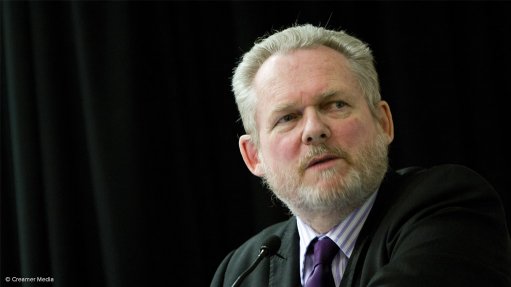
Trade and Inustry Mininster Dr Rob Davies
Photo by: Duane Daws
Localisation, transforming the South African economy into an inclusive one and skills development remained long-term goals for government, Trade and Industry Minister Dr Rob Davies said this week.
Speaking at Volkswagen South Africa’s (VWSA’s) inaugural black-owned supplier’s day in Uitenhage, in the Eastern Cape, he encouraged big business to get involved in skills development.
The supplier’s day gave 45 companies the opportunity to profile themselves to the local automotive industry. A total of 430 companies had applied to participate in the event. The applications were assessed according to certain criteria, including that the companies have a minimum 51% black ownership or a minimum 30% black female ownership. Companies owned or managed by disabled persons or war veterans were also considered.
VWSA chairperson and MD Thomas Schaefer said the concept of the suppliers’ day originated from Volkswagen’s determination to expand its business to black-owned suppliers.
“It is through this initiative that we continue to support economic transformation in South Africa and this also demonstrates our understanding of government’s priority elements of the broad-based black economic empowerment codes and the drive for ownership,” he added.
Meanwhile, Davies noted that government had, in the past, supported the automotive sector through the Motor Industry Development Programme and now supported the industry through the Automotive Production and Development Programme.
“We are confident that we have built confidence from investors,” he said.
He added that the development of more automotive components manufacturers in the country would assist government in achieving its localisation objectives.
Davies said the automotive sector had invested R27.5-billion in the South African economy in the past five years.
“It is our mission to realise empowerment that will deliver real industrialists,” he stated.
National Empowerment Fund (NEF) CEO Philisiwe Mthethwa, meanwhile, told attendees at the suppliers that the fund was well positioned to work with the automotive industry to establish an incubation ecosystem to advance the participation of black people in the manufacturing of vehicles and components for global markets.
She explained that the NEF could replicate for the automotive industry the successful model it used to develop the Strategic Projects Fund (SPF) which had incubated 31 industrial-scale projects valued at more than R28.5-billion.
The SPF had enabled a host of small- to medium-sized black enterprises to participate in high-value industrial projects alongside established global operators in what had become a pioneering path for the Black Industrialist Policy, she noted.
“As the NEF, we have found that incubation can go a long way towards establishing and nurturing enterprises that can supply components to automotive production lines,” Mthethwa commented.
She further stated that public–private partnerships were needed in the automotive industry is to reach its target of 1.2-million new-vehicle sales a year by 2020.